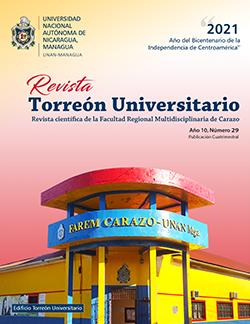Innovative didactic experience in the training of teachers of primary education. Didactic subject of the social sciences
DOI:
https://doi.org/10.5377/rtu.v10i29.12701Keywords:
Social Sciences, Didactics, Innovation, Participatory MethodologiesAbstract
The article brings together experiences, stories and testimonies of an innovative didactic experience developed in the subject Didactics of the Social Sciences in the training of teachers of Primary Education. The collection of information was carried out using techniques such as participant observation and conducting interviews with students, and instruments such as field diaries were used to document the significant aspects observed in the classroom. The results of the systematization describe a set of didactic methodologies that, without claiming to be a methodical outline of solutions, lead the reader to a niche of self-reflection about what is beyond what we do daily in the classroom. Therefore, in his writing each of the following methodologies developed are described: Pedagogical innovation at the beginning and end of a class, innovative didactic strategies, socialization, participation and collective construction of learning, and the classroom epicenter of innovation. At the end, a brief reflection is made on the emerging challenges that teachers have in front of pedagogical innovation as an inescapable task in the learning processes of the XXI Century,and by way of conclusion, it is maintained that the implementation of participatory methodologies generates more motivation and greater conditions for the construction of significant learning in the student body.
Downloads
References
Abreu, A. (2017, julio). La Ética en la Investigación Educativa. Revista Scientific, 2(4):338-350. https://doi.org/10.29394/scientific.issn.2542-2987.2017.2.4.19.338-350
Benejam, P. y Pagés, J. (1997). Enseñar y aprender ciencias sociales, geografía e historia en la educación secundaria. Barcelona: Horsori.
Bernal, C. (2010). Metodología de la investigación. (3ra ed.). Colombia: Pearson Educación.
Imbernon, F. y Medina, J. (2008). Metodología participativa en el aula universitaria. La participación del alumnado. Barcelona: Octaedro.
Jordán, S. (2009). Didáctica de los Estudios Sociales para la Educación Primaria. Costa Rica: Coordinación Educativa y Cultural Centroamericana.
López Noguero, F. (2007). Metodología participativa en la Enseñanza Universitaria. España: NARCEA.
Miralles, P., Molina, S. y Ortuño, J. (2011). La Investigación en Didáctica de las Ciencias Sociales. Educatio Siglo XXI, 29(1):149-174.
Murillo, F., Martínez, C. y Hernández, R. (2011). Decálogo para una Enseñanza Eficaz. Revista Iberoamericana sobre Calidad, Eficacia y Cambio en Educación, 9(1):6-27.
Orozco, J. y Díaz, A. (2018). Articulación del plan de estudios de Ciencias Sociales de Educación Secundaria y Educación Superior. Revista Investigium IRE, 9(1):12-27.
Pimienta, J. (2007). Metodología constructivista. Guía para la planeación docente. (2da ed.). México: Pearson Educación.
Pimienta, J. (2011). Secuencias didácticas: Aprendizaje y evaluación de competencias en Educación Superior. Bordón, 63(1):77-92.
Pimienta, J. (2012). Las competencias en la docencia universitaria. Preguntas frecuentes. México: Pearson Educación.
Prats, J. (2002). La «didáctica de las ciencias sociales» en la Universidad española: Estado de la cuestión. Revista de Educación, (328):81-96.
Rodríguez-Dueñas, W., Denegri, J. y Alcocer, M (2017). Innovación pedagógica: Una oportunidad para la comunidad universitaria en donde todos ganan. Mesa de Reflexión en Innovación Pedagógica y Didáctica, (11):1-12. https://repository.urosario.edu.co/bitstream/handle/10336/14067/Reflexiones%20pedagogicas%2011_final.pdf?sequence=1
Downloads
Published
Issue
Section
License
Copyright (c) 2021 Universidad Nacional Autónoma de Nicaragua, Managua, Nicaragua

This work is licensed under a Creative Commons Attribution-NonCommercial-NoDerivatives 4.0 International License.
The authors who publish in this journal agree to the following terms.
- The author or authors of the articles, essays or research grant the National Autonomous University of Nicaragua, Managua (UNAN-Managua) the editing rights (copyright) of the submitted work, therefore the University has the exclusive right to publish the article for the entire copyright period.
- These copyrights/authors authorize Torreón Universitario Magazine and the University to edit and disseminate/publish the article in said Magazine, including printed and electronic reproduction, storage, retrieval and any other type of publication, and sources of secondary information as services. of summaries and databases, they also empower it to protect the article against unauthorized use for dissemination by printed or electronic media (PDF, HTML, EPUB, XML or others).
License for use of content
The magazine uses the Creative Commons Attribution-NonCommercial-NoDerivs 4.0 International License.
Under this statement:

This journal is licensed under a Creative Commons Attribution-NonCommercial-NoDerivatives 4.0 International License. It can be copied, distributed and transmitted publicly as long as the author and source are cited (Revista Torreón Universitario), it should not be modified or used for any commercial purpose. The full license can be found at http://creativecommons.org/licenses/by-nc-nd/4.0/.



